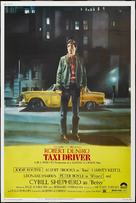Reviews provided by RottenTomatoes
Vincent Canby, New York Times: You may want to argue with Taxi Driver at the end, and with good reason, but it won't be a waste of time. Read more
Jonathan Rosenbaum, Chicago Reader: Perhaps the most formally ravishing-as well as the most morally and ideologically problematic-film ever directed by Martin Scorsese, the 1976 Taxi Driver remains a disturbing landmark for the kind of voluptuous doublethink it helped ratify. Read more
Richard Schickel, TIME Magazine: [Scorsese] seems to need scripts with well-designed humor and performers with the spirit of Ellen Burstyn to compensate for what seems to be a fundamentally depressed view of life and the belief that sobriety is the equivalent of seriousness. Read more
Kathleen Carroll, New York Daily News: De Niro ... manages to be as sad as he is frightening. From his general discomfort with others and his feeble attempts at communication, it's possible to recognize the root cause of Travis' inner distress as a terrible longing for approval. Read more
James Berardinelli, ReelViews: A masterful psychological study, the depth of which can only fully be appreciated on repeat viewings. Read more
Roger Ebert, Chicago Sun-Times: One of the best and most powerful of all films. Read more
Mick LaSalle, San Francisco Chronicle: The heart and soul of Taxi Driver are twisted in a way that can't be faked or copied. Read more
Ben Walters, Time Out: New York may have changed, but Taxi Driver is as powerful and painful as ever. Read more
A.D. Murphy, Variety: It's a powerful film and a terrific showcase for the versatility of star Robert De Niro. Read more
J. Hoberman, Village Voice: Like Werner Herzog's Aguirre or Coppola's Apocalypse Now, Taxi Driver is auteurist psychodrama. Read more
Michael Atkinson, Village Voice: Martin Scorsese's history-making scald is truly a phenomenon from another day and age. Which is to say, imagine a like-minded film of this decade killing at the box office and getting nommed for Best Picture. Read more
Desson Thomson, Washington Post: Since the mid-1970s, the movie has become presciently emblematic of our emotionally diseased, violence-prone culture. Read more

